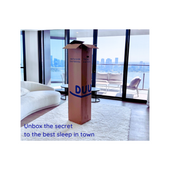Fly-in fly-out (FIFO) workers play a critical role in the mining industry, especially in Western Australia, where mining operations are a significant part of the economy.
These workers often face unique challenges, including working long hours and enduring less sleep while on site.
The demanding nature of FIFO work makes it essential for these workers to get quality sleep, particularly when they return to Perth for their breaks.
Here, we identify the importance of quality sleep for FIFO workers, the impact of sleep deprivation, and tips for achieving better sleep.
The Demanding Life of FIFO Workers
Long Hours and Grueling Schedules
FIFO workers typically work long shifts that can last 12 hours or more.
These shifts are often part of a roster system, where workers spend several weeks on-site followed by a period of rest at home.
The nature of mining work requires vigilance, physical endurance, and mental alertness, making it crucial for workers to get adequate rest.
Challenges of Sleeping on Site
Sleeping conditions on mining sites are often less than ideal. Workers may share accommodations, deal with noise from equipment and other workers, and face irregular sleep patterns due to shift work.
These factors can lead to inadequate and poor-quality sleep, impacting overall health and job performance.
The Impact of Sleep Deprivation on FIFO Workers
Physical Health Consequences
Lack of sleep can have serious consequences on physical health. Chronic sleep deprivation is associated with a range of health issues, including:
- Cardiovascular Problems: Insufficient sleep increases the risk of heart disease, hypertension, and stroke.
- Weakened Immune System: A lack of rest can compromise the immune system, making workers more susceptible to illnesses.
- Obesity and Diabetes: Sleep deprivation can disrupt metabolism and increase the risk of obesity and type 2 diabetes.
Mental Health Effects
The mental health of FIFO workers is also at risk due to inadequate sleep. Common mental health issues linked to sleep deprivation include:
- Depression and Anxiety: Persistent lack of sleep can exacerbate symptoms of depression and anxiety.
- Cognitive Impairment: Sleep is essential for cognitive functions such as memory, problem-solving, and decision-making. Sleep-deprived workers may experience difficulties in these areas.
- Mood Swings: Irritability and mood swings are common among those who do not get enough sleep.
Safety Risks
For FIFO workers, who often operate heavy machinery and work in hazardous environments, sleep deprivation poses significant safety risks. Fatigue can lead to:
- Accidents and Injuries: Reduced alertness and slower reaction times increase the likelihood of workplace accidents.
- Errors in Judgment: Sleep-deprived workers are more prone to making mistakes, which can have serious consequences in a mining setting.
The Importance of Quality Sleep
Rest and Recovery
When FIFO workers return to Perth, it is vital for them to use this time to rest and recover from the physical and mental demands of their work.
Quality sleep plays a crucial role in the body’s ability to heal and rejuvenate.
It helps to repair tissues, consolidate memories, and regulate hormones.
Enhancing Performance
Adequate sleep enhances cognitive function, mood, and overall performance.
Well-rested workers are more alert, focused, and capable of performing their tasks efficiently.
This is especially important for FIFO workers who must be at their best when they return to the mining site.
Maintaining Health and Well-being
Quality sleep is essential for maintaining long-term health and well-being. It supports a healthy immune system, regulates metabolism, and promotes emotional stability.
For FIFO workers, prioritizing sleep during their time off can help mitigate the health risks associated with their demanding work schedule.
Tips for Achieving Better Sleep
Create a Sleep-Friendly Environment
- Comfortable Mattress: Invest in a high-quality mattress that provides the right balance of support and comfort. A good mattress can make a significant difference in the quality of sleep.
- Dark and Quiet Room: Ensure your bedroom is dark and quiet to promote uninterrupted sleep. Consider using blackout curtains and earplugs if necessary.
- Cool Temperature: Keep the bedroom at a cool, comfortable temperature to facilitate better sleep.
Establish a Routine
- Consistent Sleep Schedule: Try to go to bed and wake up at the same time every day, even on weekends. This helps regulate your body’s internal clock.
- Wind-Down Routine: Establish a relaxing pre-sleep routine, such as reading, taking a warm bath, or practicing mindfulness. Avoid stimulating activities and screens before bedtime.
Manage Stress
- Mindfulness and Relaxation: Practice mindfulness techniques, such as deep breathing exercises or meditation, to reduce stress and promote relaxation.
- Physical Activity: Engage in regular physical activity, but avoid vigorous exercise close to bedtime.
Limit Stimulants
- Caffeine and Nicotine: Avoid consuming caffeine and nicotine in the hours leading up to bedtime, as they can interfere with sleep.
- Alcohol: While alcohol may help you fall asleep initially, it can disrupt sleep later in the night. Limit alcohol consumption, especially before bed.
Seek Professional Help
- Sleep Disorders: If you continue to experience sleep problems despite making lifestyle changes, consider consulting a healthcare professional. Conditions like sleep apnea or insomnia may require medical intervention.
- Mental Health Support: Address any underlying mental health issues, such as anxiety or depression, that may be affecting your sleep. Seeking support from a mental health professional can be beneficial.
Local Resources in Western Australia
Sleep Clinics
Western Australia has several sleep clinics that offer diagnostic and treatment services for sleep disorders:
- Perth Sleep Clinic: Provides comprehensive sleep assessments and treatments, including for sleep apnea and insomnia.
- Western Australia Sleep Disorders Research Institute: Offers specialized care and conducts research on various sleep disorders.
Mental Health Services
For mental health support, FIFO workers can access services such as:
- Lifeline WA: Provides crisis support and suicide prevention services.
- Beyond Blue: Offers resources and support for mental health issues, including depression and anxiety.
Employee Assistance Programs
Many mining companies offer Employee Assistance Programs (EAPs) that provide confidential counseling and support services for FIFO workers.
These programs can help address both mental health and sleep-related concerns.
Quality sleep is vital for the health, safety, and performance of FIFO workers in Western Australia’s mining industry.
The demanding nature of their work, combined with the challenges of sleeping on-site, makes it essential for these workers to prioritize rest and recovery during their time off in Perth.
By creating a sleep-friendly environment, establishing a consistent routine, managing stress, and seeking professional help when needed, FIFO workers can improve their sleep quality and overall well-being.
Prioritizing sleep not only enhances personal health but also contributes to safer and more efficient workplace operations.
For FIFO workers, investing in quality sleep is a crucial step towards a healthier and more balanced life, both on and off the mining site.
FAQs
Q: How does poor sleep affect FIFO workers?
A: Poor sleep can lead to significant negative impacts on the physical and mental health of FIFO workers.
It can result in sleep disturbances, decreased sleep efficiency, and overall poor sleep quality, which, in turn, affects their performance and well-being.
Q: What are common sleep issues faced by FIFO workers?
A: Common sleep issues for FIFO workers include irregular sleep patterns, difficulty falling asleep after night shifts, and shorter total sleep duration.
These issues often stem from the challenges of adjusting to shift work and maintaining a consistent sleep schedule.
Q: How can FIFO workers improve their sleep quality?
A: FIFO workers can improve their sleep quality by maintaining a regular sleep schedule, creating a comfortable sleep environment, and utilizing relaxation techniques before bed.
Keeping sleep diaries can also help them track their sleep patterns and identify disturbances.
Q: What is the recommended amount of sleep for FIFO workers?
A: The sleep health foundation recommends that adults, including FIFO workers, aim for 7-9 hours of quality sleep per night to support optimal health and performance.
Q: What impact does sleep loss have on FIFO workers' performance?
A: Sleep loss can severely impact FIFO workers' performance, leading to reduced cognitive function, slower reaction times, and increased risk of accidents.
This can be particularly dangerous in high-stakes work environments.
Q: How does the sleep period differ for day and night shift workers?
A: The sleep period for night shift workers is often shorter and more fragmented compared to day shift workers.
This difference in sleep duration can contribute to poorer sleep quality and increased fatigue for those working night shifts.
Q: What role does sleep efficiency play in the overall sleep health of FIFO workers?
A: Sleep efficiency, which measures the ratio of time spent asleep to the total time spent in bed, is crucial for FIFO workers.
High sleep efficiency indicates better sleep health, while poor sleep efficiency can lead to feelings of fatigue and reduced alertness.
Q: Can deep sleep impact the health of FIFO workers?
A: Yes, deep sleep is essential for physical recovery and cognitive function.
FIFO workers who struggle to achieve sufficient deep sleep may experience heightened fatigue and poorer overall health.
Q: How can FIFO workers address reported poorer sleep quality?
A: FIFO workers can address reported poorer sleep quality by implementing strategies to improve sleep quantity and quality, such as optimizing their sleep environment, managing stress levels, and establishing a consistent sleep routine.
Q: Why is quality sleep particularly important for FIFO workers?
A: Quality sleep is crucial for FIFO workers because they often face irregular schedules and night shifts, which can significantly impact their sleep health.
Poor sleep can lead to decreased alertness, impaired decision-making, and increased risk of accidents on the job.
Adequate sleep duration and efficiency are essential for maintaining physical and mental health, as well as job performance.
Q: How does poor sleep affect FIFO workers' overall well-being?
A: Poor sleep quality can have severe consequences for FIFO workers.
It can lead to fatigue, irritability, and decreased cognitive function. Over time, chronic sleep loss can contribute to various health issues, including cardiovascular problems, weight gain, and mental health disorders.
Additionally, it can negatively impact work performance and safety, potentially putting both the worker and their colleagues at risk.
Q: What are some common sleep disturbances experienced by FIFO workers?
A: FIFO workers often experience various sleep disturbances due to their unique work schedules.
These can include difficulty falling asleep or staying asleep, fragmented sleep, and reduced total sleep time.
Many report poorer sleep quality during their work rotations, especially when adapting to night shifts.
Jet lag-like symptoms can also occur when transitioning between work and home schedules.
Q: How much sleep do FIFO workers need compared to other shift workers?
A: While individual sleep needs may vary, FIFO workers generally require the same amount of sleep as other adults – typically 7-9 hours per 24-hour period.
However, due to the nature of their work, FIFO workers may need to be more intentional about achieving this sleep duration.
The Sleep Health Foundation recommends that shift workers, including FIFO workers, prioritize both sleep quantity and quality to maintain optimal health and performance.
Q: What strategies can FIFO workers use to improve their sleep quality?
A: To improve sleep quality, FIFO workers can:
1. Establish a consistent sleep schedule, even on days off
2. Create a dark, quiet, and cool sleep environment
3. Limit caffeine and alcohol consumption, especially before bedtime
4. Practice relaxation techniques like meditation or deep breathing
5. Use blackout curtains or eye masks to block out light during day sleep
6. Invest in a high-quality mattress, like DuuDuu, designed for optimal comfort and support
Q: How can keeping sleep diaries benefit FIFO workers?
A: Keeping sleep diaries can be extremely beneficial for FIFO workers.
By tracking their sleep patterns, duration, and subjective sleep quality, workers can identify trends and factors affecting their sleep.
This information can help them make informed decisions about their sleep habits and routines.
Additionally, sleep diaries can be valuable tools when consulting with healthcare professionals about sleep issues.
Q: What role does a quality mattress play in improving sleep for FIFO workers?
A: A high-quality mattress, such as those offered by DuuDuu, plays a crucial role in improving sleep for FIFO workers.
A supportive and comfortable mattress can enhance sleep efficiency, reduce sleep disturbances, and promote deeper, more restorative sleep.
This is particularly important for FIFO workers who may have limited control over their sleep environment while on-site.
Investing in a quality mattress can make a significant difference in overall sleep quality and help mitigate the challenges of irregular work schedules.
Q: Are there any recent studies on sleep patterns of FIFO workers?
A: Yes, there have been several recent studies on FIFO workers' sleep patterns.
For example, research conducted by the University of South Australia found that FIFO workers often experience poor sleep quality and shorter sleep duration compared to the general population.
Another study reported that FIFO workers frequently struggle with maintaining consistent sleep schedules, which can negatively impact their overall health and well-being.
These findings underscore the importance of prioritizing sleep health in the FIFO industry.


















































